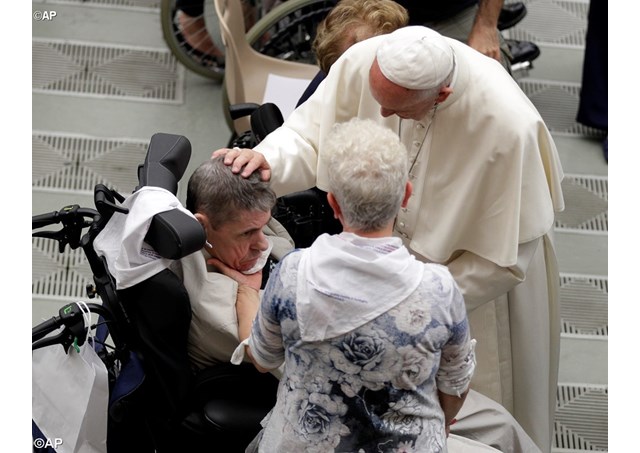We were privileged, on 18 May 2017, to attend a Papal Audience at which Pope Francis gave his love and support for patients and families with Huntington’s disease (HD). Also present were their carers and advocates as well as researchers striving to find treatments and cures for this devastating disease.
HD is a genetic disorder that begins – usually in mid-life – with jerky movements (chorea), followed by inexorable cognitive decline and psychiatric symptoms (especially depression and psychosis). There is also an even more tragic juvenile form of HD that can start as early as two years of age. There is no treatment that delays either the onset or progression of HD.
HD is inherited as an autosomal dominant condition. This means both males and females are affected. It also means that anyone with an affected parent has a 50:50 risk of developing HD. Although it is relatively rare in Britain (with a prevalence of around 12 per 100,000) there are parts of South America – most notably around Lake Maracaibo in Venezuela – where the prevalence is ten-fold higher. And the HD families of South America mostly live in abject poverty.
One of the most extraordinary things about HD is the stigma that has been associated with it. For example, in the 1930s a very distinguished British neurologist – Dr Macdonald Critchley – and without any justification, claimed in an article published by the Lancet, “all members of families affected by Huntington’s disease are liable to bear the marks of a grossly psychopathic taint; and the story of feeblemindedness, insanity, suicide, criminality, alcoholism and drug addiction becomes unfolded over and over again”. In a single sentence Critchley stigmatised both the affected and unaffected members of HD families in the cruellest possible manner.
But the stigma associated with HD was not confined to the views of a British neurologist. During the 1930s, when the eugenics movement was at its height, the forcible sterilisation of people with HD was performed in Nazi Germany, in the majority of American states, and in Sweden. But the stigma continues. We know of many families in Britain who ask their family doctors to avoid mentioning HD on their deceased family members’ death certificates. Ian McEwan in his novel Saturday – published in 2005 – states that the evil man is “evil” because he has HD! And even today – in 2017 – the British insurance industry loads the life policies of people with HD in their families but for no other genetic disorder.
Pope Francis’s Audience was arranged by a new organisation “Hidden No More” which seeks to remove the global stigma associated with HD. It was a glorious opportunity for the Pope to reach out to HD families – not only in South America but across the world – to dispel the mythology surrounding HD.
Watching the Holy Father embrace, kiss and bless those suffering from HD – and their families –was heart-rendering in its simplicity. It was a signal to the world. Victims of HD, their families, those who care for them and those who are seeking to develop treatments and cures need and deserve our love and support.
Professor Nancy Wexler PhD, FRCP.
Sir Michael Rawlins MD, FRCP, FMedSc.

